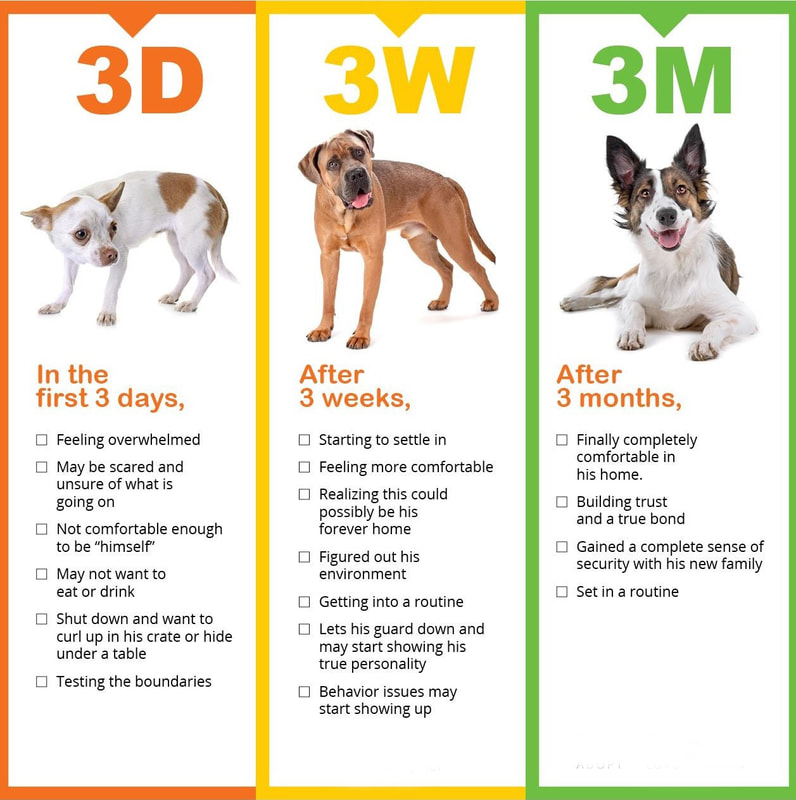|
Welcome to the
Karmic Rescue Foster Team! A Karmic Dog is a Karmic Dog for life. These dogs have already been to shelters or rescued from situations and we do not want them to go back to that. Please remember that the first week with a new dog in your home will always be the most difficult and please be understanding. This dog doesn’t know you from anyone and might be coming out of a not so great situation so please allow some time to get comfortable with your new dog and vice versa. You really are saving a life and if you stick with it, the rewards will be far greater than any house training accident! Supply Checklist:
Dog Proofing Your Home:
Dogs, especially young or untrained ones, are like children and will get into everything. This can be very stressful for you and, at worst, your house can be deadly for your dog. Kitchen cleansers, soaps, drain cleaners will kill your pet if ingested. In the garage, detergents, cleaners, anti-freeze, paint removers, garden supplies such as weed killers, snail bait, fertilizers etc. can all be deadly. Bathrooms also contain similar items. Be careful. There are many plants and bulbs (inside and out) that are poisonous. It is very important that you check for mushrooms during damp weather as these can be lethal even in small amounts. Dog-proofing your home also means making sure that you have secure high fences and gates that are locked. And remember, chocolate, grapes, raisins, garlic, onions, avocado, alcohol are all deadly to dogs so keep them out of reach. Arrival:
Setup Crate Training and Confinement
Set up a confinement area, a place your dog will stay when you can’t provide 100% supervision i.e. you’re out, or busy around the house, and can’t watch him the entire time. The ideal confinement area should be easy to clean and easy to close off with a door or baby gate. It should be mostly free of furniture and non-dog related objects (remember, everything is a potential chew toy to a dog!). The best place for a confinement area is the kitchen, laundry room, porch, empty spare room or small indoor/outdoor area. Furnish the confinement area with a bed or a crate with something soft to sleep on, a water bowl and several toys, including a favorite bone or chew toy. Note: The confinement area should be the only place your dog gets to have his favorite toy. You might think the word “confinement” has a negative connotation, but your dog’s confinement area is not a negative thing. It’s positive. The confinement area is a place your dog can call his own as he makes the transition to his new home. It’s where he gets good things, like meals and his favorite toy. It sets him up for success in the process of housetraining and alone-time training. People often give a new dog complete freedom right away. Then, when he has an accident or chews the wrong thing, they confine him, and confinement becomes punishment. If you start out giving your dog the run of the house, you’re setting him up for failure. Better to give him a safe, confined place, so he can make a gradual and successful transition to his new home. Quiet Time
We recommend that after you bring your new adopted dog home, let her check out the area of the house where she is allowed and let her figure things out for 3-4 hours with you supervising. Wait a couple of days before inviting friends etc. over to meet the new dog. Quiet time with her immediate family is important. If the dog wants to play a bit with you, that’s fine but do NOT allow her to interact with young children yet. If the dog does not solicit play or attention from you, let her establish herself for a while. Don’t force her to play. Bed Time
Put a chew toy in your dog’s crate or sleeping area when you leave him for the night. He may have trouble settling in at first, but he should eventually relax and go to sleep. Remember, it’s important not to let your dog out of his confinement area if he’s crying or barking. If he gets attention for barking, he’ll keep it up for long periods of time. Socialization
Rescue dogs come from a variety of backgrounds but all dogs can do with more socialization! After your new dog has had some time to settle in and he is showing some confidence in you, give him lots of pleasant social experiences. He should be able to meet people (and other dogs, if he’s not dog-aggressive) at home and near home. Then eventually take him to new places like parks, obedience school, etc. Make sure you allow your new dog to be handled by other people only after he has a chance to trust you. Then do introductions to other people gradually. Family members should be first then friends he knows. Introductions can take the form of petting, playing fetch, even going for a walk with a trusted, dog-oriented friend.
Housetraining
Some adult dogs are not housetrained. If your dog has an accident, it’s not because he’s incapable or unintelligent, it’s because he has not been properly trained. To successfully housetrain your dog, you need to treat him like an 8- week-old pup. The confinement area is your key to success.
Food
At Karmic Rescue we usually feed our dogs Kirkland from Costco or Rachel Ray from Walmart. A good diet can make a big difference for the rest of your dog’s life. You will do well for your dogs, if you buy a good quality dry dog food (one without by-products). Dress it with some meat broth (no salt added), leftover vegetables or lean meat scraps. Dogs with allergies or dry skin can often be helped with an Omega fatty acid supplement or salmon oil, which is often added to their diet. Water
Just as your dog needs proper nutrition from his food, water is an essential “nutrient” as well. Water keeps the dog’s body properly hydrated and promotes normal function of the body’s systems. During housebreaking, it is necessary to keep an eye on how much water your dog is drinking. Limiting water access in the evening can help avoid overnight accidents. Once he is reliably trained, he should have access to clean fresh water at all times. Make sure that the dog’s water bowl is clean and change the water often. Exercise
When walking your dog, always keep your dog on a leash. It is extremely important with a new dog that you make sure her collar fits snugly. If she is startled and backs away from you, make sure her head can’t come out of the collar. A new dog, in a new environment, will be gone in a second and may not come back to you. She doesn’t know you and has no reason to take heed of you. Patience
Your new dog needs your patience and affection, especially if he has been in many different situations recently. Whenever he does something good, be sure to let him know! Happy praise and affection really helps him to know that you care and that he is good. This includes if he is lying quietly and behaving himself…. Let him know that this is desirable behavior. Word of Warning
You may not leave your foster dog in the car. |
|


